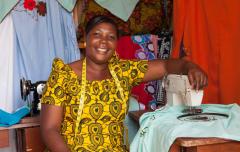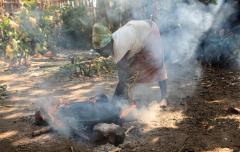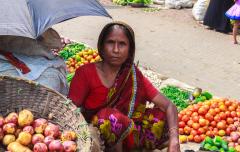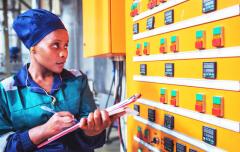Empowering women in West Africa to advance climate and energy access goals
BONN, Germany – Mahama Kappiah lives in Ghana in West Africa, where males dominate most cultural and social norms, including decision-making on who gets electricity and who doesn’t. Kappiah noticed how men were getting electricity to run their barbershops and woodworking shops, while women were left smoke-drying fish and processing maize manually.
“Big amounts of smoke and very hot,” Kappiah said, describing the poor working conditions for women smoking fish, in an interview here yesterday at the UN Climate Conference (COP23).
Kappiah is trying to change this male-centered paradigm across West Africa. He is leading a first-of-its-kind project to make gender inclusion and women’s empowerment a requirement in the region for a broad swath of energy-related siting and implementation decisions, including the hugely important topic of electricity access. The Economic Community of West African States (ECOWAS) recently approved a policy directive requiring the 15 countries to include gender assessments in evaluating and approving energy infrastructure projects. The effort is being led by the ECOWAS Centre for Renewable Energy and Energy Efficiency (ECREEE), which Kappiah leads as its executive director.
“When it comes to energy decisions, planning, design, development and construction is all done by men. You won’t see a single woman,” Kappiah said. “This is the genesis of our gender policy.”
The policy directive received strong government backing at a meeting last summer in Ghana hosted by ECREEE, the Clean Energy Solutions Center and several other groups. The project is the direct result of a collaboration between the Clean Energy Solutions Center and Sustainable Energy for All to provide governments like ECOWAS with on-demand expertise to help transform their energy systems.
The ECREEE initiative is moving forward quickly. In February, ECOWAS will be providing gender mainstreaming training for government and non-government organizations working in West Africa. Kappiah is also looking to train 100 women next year on energy entrepreneurship across various aspects of the energy value chain.
He also points to on-the-ground projects such as a women’s fishing cooperative in Senegal that received support to modernize kilns used for smoke-drying fish. In addition to healthier working and air quality conditions, the eco-friendly kilns have boosted productivity, product quality and overall income levels for women.
Kappiah is optimistic the regional effort will speed efforts to bring modern energy to hundreds of millions of people in West Africa who lack electricity. The growing popularity of household solar systems to help close these energy gaps is an especially ripe opportunity for women. Kappiah envisions a virtuous cycle: as more women are able to charge their lights and cellphones at home with solar power, they have an opportunity to pursue other economic activities, whether for sewing services, grain processing or selling solar systems to other households.
“Solar should be more of the women’s business,” he said. “They need it at home and they can see how it’s more useful.”
ECREEE is a partner of the People-Centered Accelerator, which is being formally launched, Tuesday, Nov. 14, at COP23, by Sustainable Energy for All during a High-Level Gender Day panel. The Accelerator aims to enhance clean energy access to the poorest people who will not be reached by business-as-usual approaches. The launch event begins at 11:30 a.m. CET in Bonn Zone Meeting Room 2 An Accelerator side event will be held Nov. 15 in Bonn Zone Room 12 starting at 1:15pm CET.
Photo credit: Solar Sister
In Bonn? Join us at our side activities;
- High-level plenary session: The Urban Energy/Transport Nexus: How Can Cities Be Drivers of Transformative Climate Action? (Nov. 13)
- COP23 side-event: People-Centered Accelerator (Nov. 15)
- COP23 side-event: Why Wait? Energizing Finance to Seize the Energy Access Dividend (Nov. 16)
Find out more about what SEforALL announcements and activity at COP23 here, and follow us on Twitter - @SEforALLorg - for the latest updates.



